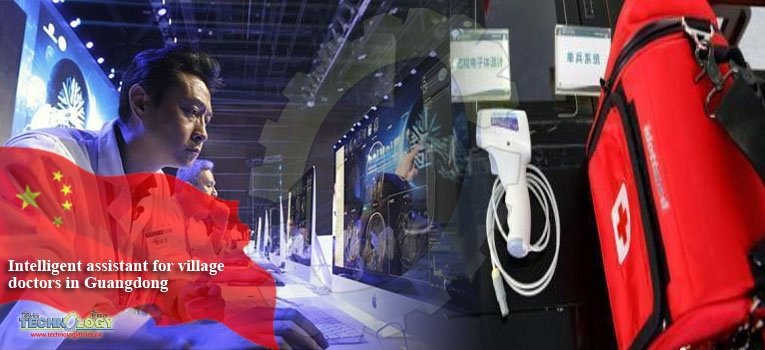Guangdong has taken the lead in introducing artificial intelligence(AI)to poverty-stricken villages with the launch of an intelligent assistant that helps village doctors carry out diagnosis and treatment, Chinanews reported.

Deng Jinke, 35, is a village doctor in Jiangying town, Yangshan county at Qingyuan city, Guangdong province, which is 32 kilometers away from downtown of Yangshan county.
In the past, the equipment in Deng’s medicine cabinet were a stethoscope and an old-fashioned mercury sphygmomanometer. Whenever somebody with a complicated case came to him for treatment, Deng was forced to send the patient to the nearby county due to shortage of resources.
But now Deng has installed “Ding Bei”, a medical treatment app, and carries a set portable monitor that weighs only 2.5 kilograms.
With the devices, villagers can get electrocardiograms at home and have no need to go to the town hospital. Moreover, health information such as blood oxygen and pulse rates can also be collected and can be stored electronically for a long time.
If it is a complicated case, the Intelligent assistant AI-doctor can help in diagnoses, with an accuracy rate of up to 95 percent.
If the village doctor is still uncertain about the diagnosis, further diagnoses can be made by doctors of the third-grade class-A level comprehensive hospitals after receiving the patient’s descriptions, pictures, videos and other information to the cloud via mobile devices.
The app “Ding Bei” was jointly developed by Guangdong Second Provincial General Hospital and a scientific research enterprise. “Ding Bei” has compiled more than 118,000 medical terms and 300 million medical records of third-grade class-A level comprehensive hospitals, covering more than 200 common diseases, and including 90 percent of the diseases diagnosed in ordinary community hospitals, according to Dr Tian Junzhang, the president of the hospital.
Village doctors can also write prescriptions directly on the “mobile workstation” by using their mobile phones. A pharmacy has been established in accordance with the frequently occurring and common diseases collected by doctors in the local county. In the future, village doctors may create their own pharmacies based on ground requirements.
After the successful launch of the Intelligent assistant AI-doctor system in poverty-stricken villages in Qingyuan city, the time and cost of shuttling between home and hospital will be reduced. Guangdong will gradually promote this medical service in 2,277 poverty-stricken villages this year, and the task is expected to be completed by the end of this year,said Huang Fei, the deputy director of the Health Commission of Guangdong province.
The Health Commission of Guangdong province added that the AI platform will ensure data security and user privacy while realizing co-construction and sharing of medical data. In the future, the platform will continue to improve services and provide better telemedicine services for the public.